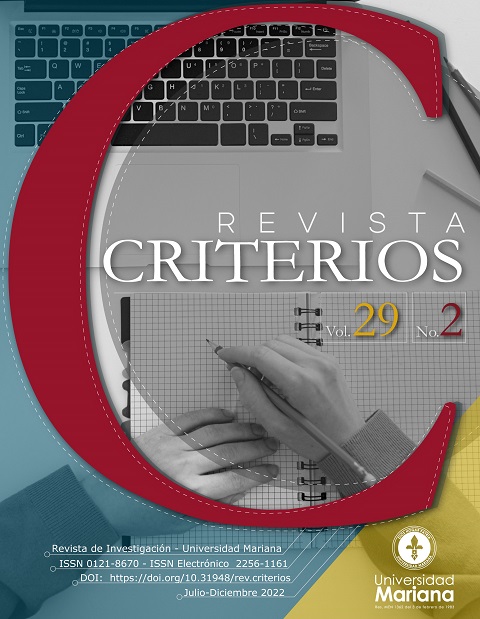Ancestral stories: an alternative for the preservation of the oral cultural identity of the Inga territory
DOI:
https://doi.org/10.31948/rev.criterios/29.2-art2Keywords:
cultural identity, oral tradition, ancestral storiesAbstract
Within the framework of the research project “Strengthening the oral cultural identity of students in grade 8 of the Institución Educativa Agropecuaria Inga de Aponte”, one of its chapters was aimed at identifying those ancestral stories that are used in the Inga de Aponte reservation, for the transmission and preservation of their own knowledge. Given the importance of the results that were extracted, this was chosen as the main purpose for the dissemination of the results in this article.
Considering the importance that the ancestral stories represent in the transmission of their own knowledge that is given from generation to generation, it was proposed to identify those that are used in the Inga territory, through the documentary review of the Comprehensive Mandate of Life and the self-report that was carried out with the Greatest Knowledgeable, finding that the Inga reservation has its own stories, which have been compiled and recorded in this document, both by the Greatest Knowledgeable and by the students of the institution.
In addition, it was found that the ancestral stories, unlike the myths, represent for the Inga community, true stories that have happened on the reservation, to leave teaching, predict the future, act as social correctives, transmit and preserve their own knowledge, which is why it was determined to include them in the proposal of strategies for the strengthening of cultural identity.
References
Álvarez, G. (2011). Los relatos de tradición oral y la problemática de su descontextualización y re-significación en contexto escolar [Tesis de Maestría, Universidad Nacional de La Plata]. http://www.memoria.fahce.unlp.edu.ar/tesis/te.746/te.746.pdf
Blasco, J. E. y Pérez, J. A. (2007). Metodologías de investigación en las ciencias de la actividad física y el deporte: ampliando horizontes. https://rua.ua.es/dspace/bitstream/10045/12270/1/blasco.pdf
Comisión Nacional de Trabajo y Concertación de la Educación para los Pueblos Indígenas (CONTCEPI). (2013). Perfil del sistema educativo indíogena propio, S.E.I.P. https://issuu.com/educacionintercultural/docs/seip
Eliade, M. (1962). Mito y Realidad (L. Gil, Trad.; 2.a ed.). Editorial Labor S. A.
Expopaz. (2012). Mandato Integral de Vida para la Pervivencia del Pueblo Inga de Aponte. https://losingaporelcambio.wordpress.com/2012/05/30/mandato-integral-de-vida-para-la-pervivencia-del-pueblo-inga-de-aponte/
González, M. R. (2017). Curriculum cultural mapuche pehuenche de tradición oral [Tesis Doctoral, Universidad de Granada]. https://digibug.ugr.es/handle/10481/47626?show=full
Guillén, A. (2016). Personajes y espacios sobrenaturales en la tradición oral de Coatepec, Veracruz [Tesis de Pregrado, Colegio de San Luis]. https://biblio.colsan.edu.mx/tesis/GuillenOrtizAdriana.pdf.
Martínez, M. (1998). La investigación cualitativa etnográfica en educación. Manual teórico-práctico (3.a ed.). Editorial Trillas.
Ministerio del Interior. (2013). Plan Salvaguarda del Pueblo Inga. https://www.mininterior.gov.co/sites/default/files/p.s_inga.pdf
Norambuena, P. y Mancilla, V. (2005). La identidad cultural como fuente de aprendizaje significativo. Geoenseñanza, 10(2), 219-234.
Ong, J. W. (1987). Oralidad y escritura. Tecnologías de la palabra (Trad. Angélica Scherp) (2.a ed.). Fondo de Cultura Económica México.
Ramírez, N. P. (2012). La importancia de la tradición oral: el grupo Coyaima - Colombia. Guillermo de Ockham, 10(2), 129-143.
Ramírez, S. (2011). Fortalecimiento de la identidad cultural y los valores sociales por medio de la tradición oral del pacífico nariñense en la Institución Educativa Nuestra Señora de Fátima de Tumaco [Tesis de Maestría, Universidad de Nariño]. http://sired.udenar.edu.co/2786/
Tocarema, M. F. (2020). Tradición ancestral indígena desde los mitos y leyendas: importancia de la oralidad y escritura como herramienta de fortalecimiento de la identidad cultural en la educación para la primera infancia [Tesis de Pregrado, Corporación Universitaria Minuto de Dios]. https://repository.uniminuto.edu/handle/10656/11577
Vansina, J. (1968). La Tradición Oral (2.a ed.). Editorial Labor.
Vasilachis, I. (1992). Métodos cualitativos I. Los problemas teórico-epistemológicos. Centro Editor de América Latina.
How to Cite
Downloads
Downloads
Published
Issue
Section
License

This work is licensed under a Creative Commons Attribution 4.0 International License.
Revista Criterios es publicada por la Editorial UNIMAR de la Universidad Mariana bajo los términos de la licencia Creative Commons Reconocimiento 4.0 Internacional (CC BY 4.0)

| Article metrics | |
|---|---|
| Abstract views | |
| Galley vies | |
| PDF Views | |
| HTML views | |
| Other views | |




